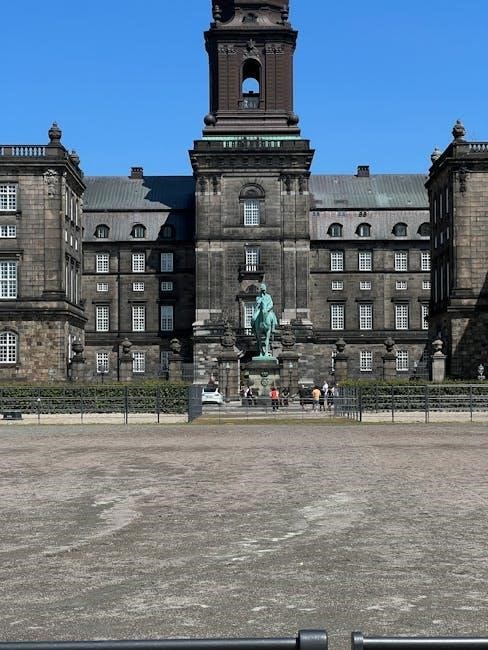Max Weber’s “Politics as a Vocation” is a seminal essay exploring political leadership‚ the state‚ and legitimacy. Delivered as a lecture in 1918 and published in 1919‚ it remains a cornerstone of political sociology‚ offering insights into the complexities of power‚ authority‚ and ethical decision-making in governance.
Background and Significance of the Essay
Max Weber’s “Politics as a Vocation” was first delivered as a lecture in 1918 at Munich University and later published in 1919. It emerged during a tumultuous period in European history‚ marked by World War I and political upheaval. Weber’s essay is a critical examination of political leadership‚ the nature of the state‚ and the ethical challenges of governance. It is considered one of his most influential works‚ offering insights into the sociology of politics and the role of legitimacy in authority. The essay’s significance lies in its timeless relevance‚ as it bridges theoretical analysis with practical observations‚ making it a foundational text in political theory and sociology.
Overview of Key Themes and Concepts
In “Politics as a Vocation”‚ Max Weber explores several key themes‚ including the definition of politics‚ the role of the state‚ and the ethical dimensions of political leadership. He argues that politics revolves around the struggle for power and the means of legitimizing it. Weber introduces the concept of the state as an institution holding a monopoly on legitimate violence. He also discusses types of authority‚ such as charismatic‚ traditional‚ and legal-rational‚ and emphasizes the tension between political conviction and responsibility. Additionally‚ Weber examines the qualities required for effective political leadership‚ highlighting the importance of a combination of passion‚ responsibility‚ and perspective. His analysis remains a cornerstone of modern political theory and sociological thought.

Key Concepts in “Politics as a Vocation”
Max Weber’s essay examines political leadership‚ the state’s role‚ and legitimacy. It explores authority types and the ethical challenges of balancing convictions with responsibility in governance.
Political Leadership and the Role of the Politician
In “Politics as a Vocation‚” Max Weber defines the politician as a leader who wields power responsibly‚ balancing personal convictions with the broader public interest. Weber argues that true political leadership requires a rare combination of passion‚ a sense of responsibility‚ and a detached objectivity. The politician must navigate complex ethical dilemmas‚ often facing difficult decisions that demand both moral integrity and practical wisdom. Weber emphasizes that leadership is not merely about holding office but about influencing the direction of society‚ making the politician a pivotal figure in shaping the future.
The Definition of the State and Its Legitimate Power
Max Weber defines the state as an entity claiming a monopoly on legitimate physical force within a defined territory. This concept is central to his analysis‚ as the state’s legitimate power is derived from the belief of its members in its authority. Weber distinguishes between traditional‚ charismatic‚ and legal-rational forms of legitimacy‚ with the modern state primarily operating under legal-rational authority. The state’s power is not merely coercive but is sustained through the acceptance of its laws and institutions by the populace. This definition underscores the state’s role in maintaining order and governance‚ forming the foundation of political organization.
Types of Legitimate Authority
Max Weber identifies three primary types of legitimate authority: traditional‚ charismatic‚ and legal-rational. Traditional authority is grounded in long-standing customs and the sanctity of established social structures‚ often embodied by patriarchal or monarchical systems. Charismatic authority arises from the extraordinary qualities of an individual leader‚ inspiring devotion and loyalty. Legal-rational authority‚ predominant in modern societies‚ is based on rational norms and laws‚ with power legitimized through bureaucratic structures. Weber emphasizes that these forms of authority are not mutually exclusive and often coexist in complex societies‚ shaping governance and political dynamics in distinct ways.

The State and Its Role in Politics
In “Politics as a Vocation‚” Max Weber delineates three forms of legitimate authority: traditional‚ charismatic‚ and legal-rational. Traditional authority stems from custom and the sanctity of age-old norms‚ while charismatic authority arises from the extraordinary qualities of a leader. Legal-rational authority‚ prevalent in modern states‚ is based on rational norms and bureaucratic systems. Weber argues these forms are not mutually exclusive and often coexist‚ shaping political legitimacy and governance structures in complex ways.

The Monopoly on Legitimate Violence
In “Politics as a Vocation‚” Max Weber asserts that the state’s defining characteristic is its monopoly on legitimate violence. This concept underscores the state’s authority to enforce order and protect its territory through coercion‚ distinguishing it from other social institutions. Weber emphasizes that this monopoly is essential for maintaining stability and security within society. However‚ he also highlights the ethical dilemmas arising from the state’s use of force‚ as it often involves balancing power with accountability. This idea remains central to understanding modern governance and the complexities of state authority‚ making it a cornerstone of political sociology and a key theme in Weber’s work.
The Evolution of the State and Its Functions
Max Weber traces the evolution of the state from patrimonial to bureaucratic structures‚ emphasizing its transformation in function and legitimacy. Early states relied on traditional authority‚ while modern states are characterized by rational-legal systems; Weber highlights how the state’s role expanded from maintaining order to providing public services and regulating economic activities. This evolution reflects the increasing complexity of societal needs and the state’s adaptation to ensure stability and progress. Weber’s analysis underscores the dynamic nature of the state‚ illustrating how its functions have grown to address the challenges of modernity while balancing power and accountability in governance.

Ethical Dimensions of Politics
Max Weber explores the moral complexities of political action‚ emphasizing the tension between personal convictions and responsible governance. He argues that politicians must balance ethics with practical realities‚ ensuring their actions align with both their values and the greater good‚ while navigating the inherent moral dilemmas of power and decision-making.
The Tension Between Convictions and Responsibility
Max Weber highlights the inherent tension between personal convictions and political responsibility. He argues that politicians must balance their ethical beliefs with the practical demands of governance. Weber emphasizes that true political leadership requires a commitment to both ideals and the consequences of one’s actions. This tension is central to his concept of the “ethic of responsibility‚” where decisions must consider their broader impact on society. Weber warns against rigid adherence to convictions without regard for outcomes‚ advocating instead for a nuanced approach that integrates moral principles with pragmatic realities. This duality remains a cornerstone of his analysis of political ethics and leadership.
The Role of Ethics in Political Decision-Making
Max Weber underscores the significance of ethics in shaping political decisions‚ distinguishing between two contrasting approaches: the “ethic of conviction” and the “ethic of responsibility.” The former prioritizes unwavering adherence to moral principles‚ while the latter emphasizes accountability for the consequences of actions. Weber argues that effective political leadership requires striking a balance between these two ethical frameworks. He critiques politicians who cling solely to convictions without considering the practical outcomes of their decisions. Conversely‚ he warns against a purely pragmatic approach that neglects moral considerations. Weber advocates for a leader who integrates ethical principles with a clear understanding of the broader implications of their actions‚ ensuring decisions align with both moral integrity and societal well-being.

Contemporary Relevance of Weber’s Essay
Max Weber’s “Politics as a Vocation” remains highly relevant today‚ offering insights into current political challenges. Its analysis of power‚ authority‚ and ethical leadership continues to inform modern governance and political discourse.
Applications of Weber’s Ideas in Modern Politics
Max Weber’s concepts from “Politics as a Vocation” continue to resonate in modern political analysis. His distinction between conviction and responsibility is often cited in discussions about leadership ethics.
Critique and Challenges to Weber’s Views
While Weber’s ideas remain influential‚ critics argue his focus on legitimacy and authority overlooks power dynamics rooted in inequality. Additionally‚ the notion of a monopoly on violence has been challenged by contemporary theorists who emphasize decentralized forms of governance and non-state actors. Weber’s emphasis on the charismatic leader has also faced scrutiny‚ particularly in contexts where democratization and participatory politics are prioritized. These critiques highlight the need for a more nuanced understanding of political power in today’s complex and multifaceted world.
Max Weber’s “Politics as a Vocation” remains a timeless exploration of political leadership‚ power‚ and ethics‚ offering enduring insights into the complexities of governance and human society.

Max Weber’s “Politics as a Vocation” centers on the dual demands of political leadership: balancing convictions with responsibility. He defines the state as wielding a monopoly on legitimate violence‚ emphasizing its role in maintaining order. Weber distinguishes between three types of legitimate authority—traditional‚ charismatic‚ and bureaucratic—each shaping governance. He underscores the ethical dilemmas inherent in politics‚ where leaders must reconcile personal beliefs with practical outcomes. Weber also warns against the dehumanizing effects of bureaucratic domination and the importance of ethical conduct in policymaking. His work remains a foundational analysis of political power‚ leadership‚ and the moral complexities of governance.
Reflection on the Timeless Value of “Politics as a Vocation”
Max Weber’s “Politics as a Vocation” endures as a timeless exploration of political dynamics‚ offering profound insights into leadership‚ power‚ and ethics. Its relevance transcends historical contexts‚ resonating with contemporary debates on governance and authority. Weber’s analysis of the state’s monopoly on violence and the interplay of conviction and responsibility remains pivotal in understanding modern political challenges. His warnings about bureaucratic rationalization and the moral dilemmas of leadership continue to inspire critical reflection in political theory and practice‚ ensuring the essay’s enduring influence in sociology‚ political science‚ and beyond.
